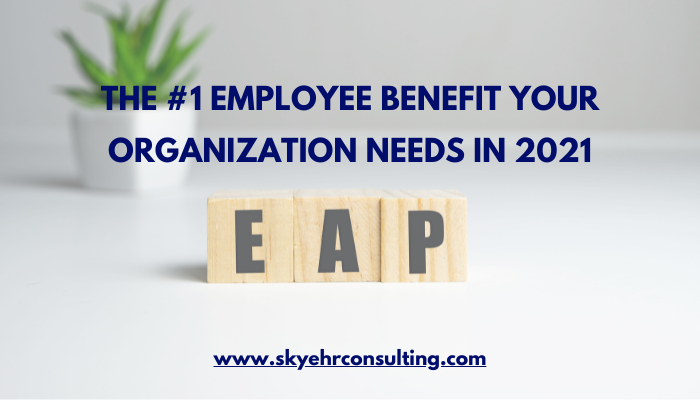The #1 Employee Benefit Your Organization Needs in 2021
I’m often asked by employers…
"What can we do to help our employees....
...prevent burnout
...manage stress
...prioritize wellness?”
I typically answer this question by asking,
"Have you thought about implementing an Employee Assistance Program?"
In a nutshell, an Employee Assistance Program (EAP) is a relatively low cost, high-impact employer-paid benefit program that supports mental health in the workplace through individual, confidential counseling and other wellness offerings.
I was recently interviewed for an article with the Human Resources Certification Institute (HRCI), "Launching and Managing an Employee Assistance Program." In it, the author writes:
"Responding to COVID-19 generated widespread awareness of the impact of mental health on employee health and performance. According to research from Unum, 85% of employers cited concerns over employees’ mental health and wellness — a concern shared by 60% of employees themselves.
Although employee assistance programs have been historically underused, the climate is right for adding and promoting these value-adding benefits. The conversation around mental health, especially within the context of the workplace, has progressed past much of the stigma employees often associate with it.
Mental health and well-being remain at the forefront of HR’s concerns, and EAP services can contribute to positive change. Here’s how to launch and manage an EAP at your organization."
Over my nearly 20 years of working with EAPs, I've found.....
Common MYTHS about EAPs:
They are expensive/cost prohibitive
They are for crisis, not prevention
No one wants to use them
Common TRUTHS about EAPs:
EAPs are relatively affordable and a wise investment for the overall health of your leaders, employees, and organization. (Not to mention, EAP referrals can help to reduce risk in sticky employee situations.)
EAPs offer both preventative support and crisis management. For example, I recently learned about Neely EAP, that offers "Couch-Time Check-ins" to encourage being proactive about mental health.
Telehealth for mental health/counseling sessions will continue to increase EAP utilization. Plus many EAPs offer newsletters, lunch n' learns and orientation sessions to increase employee participation.
In short, if you're looking for a way to support your employees, leaders, and the overall health of your organization, consider implementing what I believe is the #1 most important benefit of 2021, an EAP.
Do you want expert guidance on how to implement an EAP at your organization?
In honor of Mental Health Awareness Month, you'll receive 10% off an HR Strategy Session. Contact me at skye@skyehrconsulting.com by 5/31/2021 to receive 10% off your HR Strategy Session.
Ways to Work with Skye
Monthly HR Consulting: On-demand monthly contracted HR services customized to meet your business needs. Quickly offload HR tasks to an experienced consultant.
Leadership Training: Interactive in-person or online training tailored to your organization. Build leadership skills with relevant HR & leadership training.
Employee Handbooks: Handbooks tailored to your organization’s unique values and focused on reducing State and Federal compliance risk.
HR Strategy Session: Get quick answers to your HR questions from an HR pro. Receive expert guidance and a clear plan of action to resolve your immediate HR issues.
Leadership Coaching: Individualized, results-oriented coaching to help you achieve your career goals. Plus Career Coaching & Resume Writing for job seekers.
HR Special Projects: Impartial personnel Investigations, on-demand recruitment & onboarding, compensation planning, & more.
